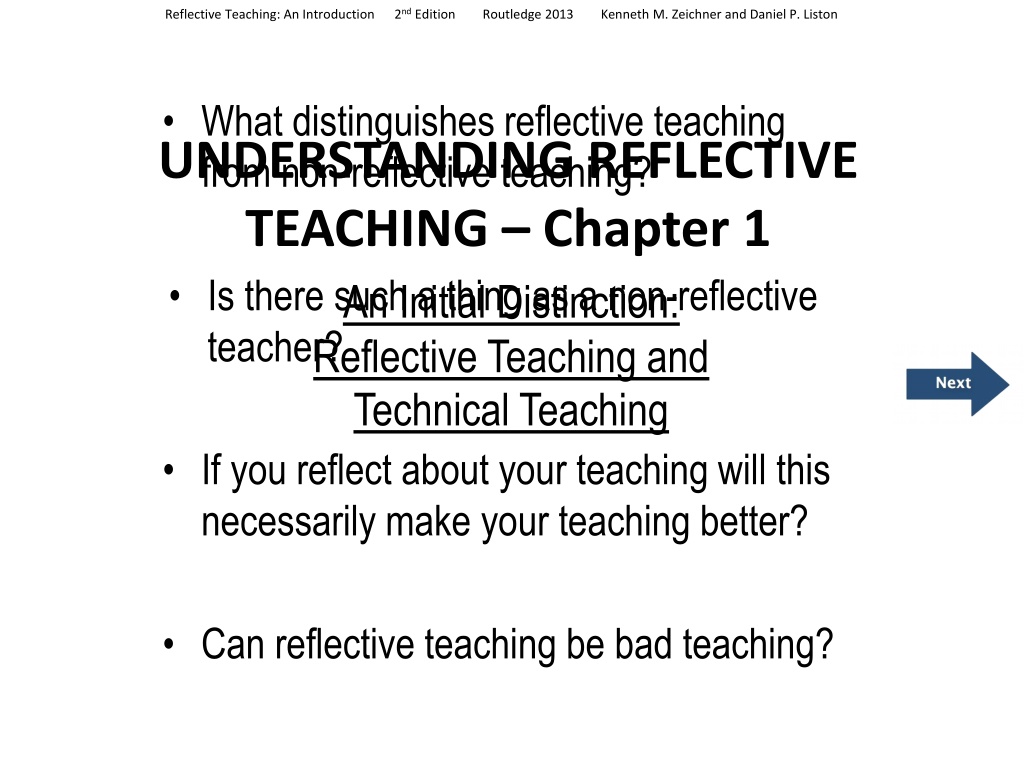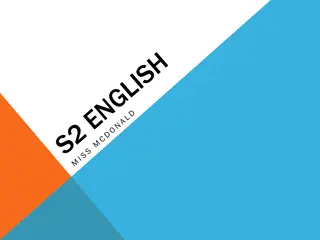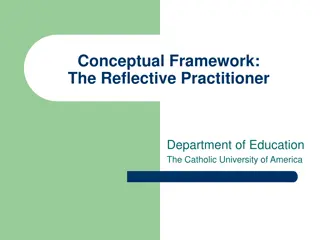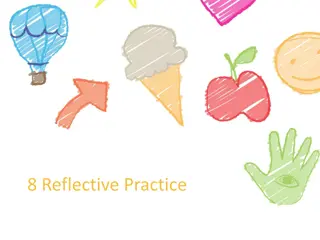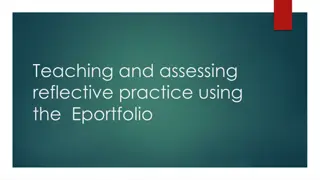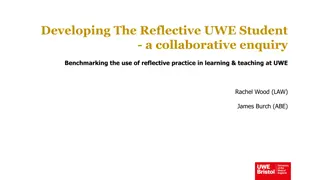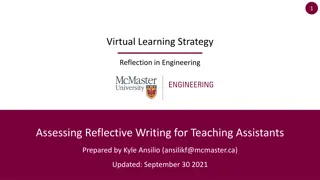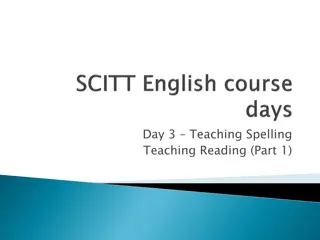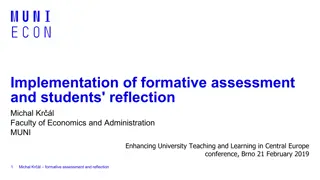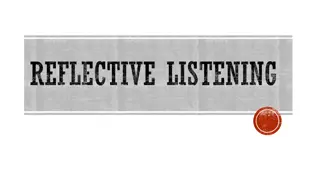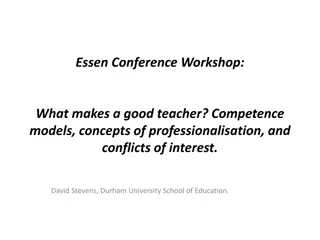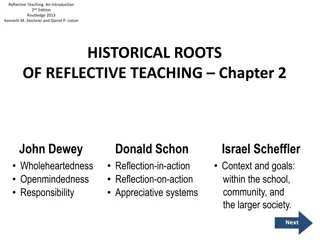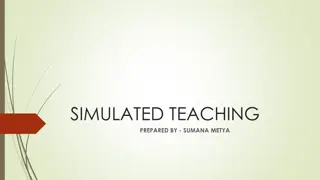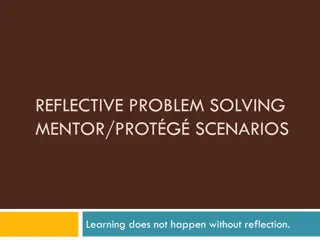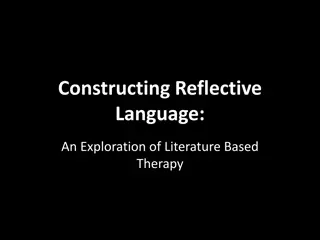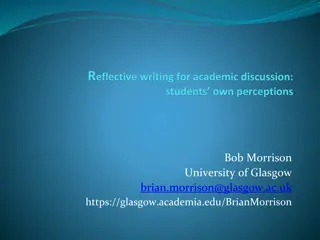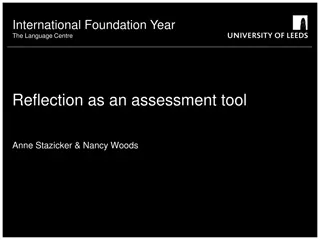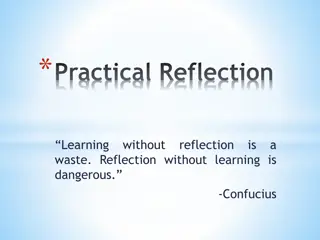Understanding Reflective Teaching: An Introduction
Reflective teaching involves actively questioning educational goals, classroom contexts, and personal assumptions. It encourages teachers to play leadership roles in curriculum development and school reform. The movement towards reflective practice rejects top-down educational reform, emphasizing teachers' active involvement in shaping the purpose and direction of their work.
Download Presentation

Please find below an Image/Link to download the presentation.
The content on the website is provided AS IS for your information and personal use only. It may not be sold, licensed, or shared on other websites without obtaining consent from the author. Download presentation by click this link. If you encounter any issues during the download, it is possible that the publisher has removed the file from their server.
E N D
Presentation Transcript
Reflective Teaching: An Introduction 2nd Edition Routledge 2013 Kenneth M. Zeichner and Daniel P. Liston What distinguishes reflective teaching from non-reflective teaching? UNDERSTANDING REFLECTIVE TEACHING Chapter 1 Is there such a thing as a non-reflective teacher? An Initial Distinction: Reflective Teaching and Technical Teaching If you reflect about your teaching will this necessarily make your teaching better? Can reflective teaching be bad teaching?
If a teacher never questions the goals and the values that guide his or her work, the context in which he or she teaches, or This view is based on a In order to teach don't you have to think about your teaching? never examines his or her assumptions distinction between teaching that is reflective and teaching that is technically focused. And isn't such thinking the same thing as reflecting on your teaching? then it is our belief that this individual is not engaged in reflective teaching.
On Reflective Teaching Did your own teacher education program prepare you to be the kind of teacher who questions the educational goals and the classroom and school contexts? When you think about a classroom problem, do you try to see it from different "angles"? Do you think that teachers should play leadership roles in curriculum development, program development, and school reform or just stick to their work in the classroom?
During the last two decades, the slogan of reflective teaching has been embraced by teachers, teacher educators, and educational researchers all over the world. The move toward seeing teachers as reflective practitioners is also a rejection of top-down forms of educational reform that involve teachers only as conduits for implementing programs and ideas formulated elsewhere.
On the surface, the reflective practice movement involves a recognition that teachers should be active in formulating the purposes and ends of their work That they examine their own values and assumptions And that they need to play leadership roles in curriculum development and school reform.
As Susan Lytle and Marilyn Cochran-Smith (1990) said: The voices of teachers, the The voices of teachers, the questions and problems they questions and problems they Colleges, Universities, and Research and Development Centers pose, the frameworks they use to pose, the frameworks they use to interpret and improve their interpret and improve their practice, and the ways they define practice, and the ways they define and understand their work lives and understand their work lives are absent from the literature of are absent from the literature of research on teaching. research on teaching. have attempted to define a so-called "knowledge base" for teaching that excludes the voices and insights of teachers themselves. Lytle and Cochran Lytle and Cochran- -Smith Smith argued argued that involvement in the classroom, they bring a perspective to involvement in the classroom, they bring a perspective to understanding understanding the complexities of teaching that cannot be the complexities of teaching that cannot be matched by external matched by external researchers. researchers. that because of teachers' direct because of teachers' direct
A reflective teacher: Reflective teaching emphasizes five key features examines, frames, and attempts to solve the dilemmas of classroom practice is aware of and questions the assumptions and values he or she brings to teaching is attentive to the institutional and cultural contexts in which he or she teaches takes part in curriculum development and is involved in school change efforts takes responsibility for his or her own professional development
Underlying the apparent similarity among those who have embraced the concept of reflective teaching are vast differences in perspectives about teaching, learning, schooling, and the social order. The Bandwagon of Reflective Teaching According to Calderhead (1989): Reflective teaching has been justified on grounds ranging from moral responsibility to technical effectiveness, and reflection has been incorporated into teacher education courses as divergent as those employing a behavioral skills approach, in which reflection is viewed as a means to the achievement of certain prescribed practices, to those committed to a critical science approach in which reflection is seen as a means toward emancipation and professional autonomy. Amidst the explosion of interest in the idea of teachers as reflective practitioners, there has been a great deal of confusion about what is meant in particular instances by the use of the term reflective teaching.
One of the central problems has to do with the vagueness and ambiguity of the term, and with a misunderstanding of what is entailed in reflective teaching. Is any thinking about teaching that teachers do reflective teaching? Is any action a teacher takes supportable, just because they have thought about it in some systematic way? We would answer no to both of these questions.
